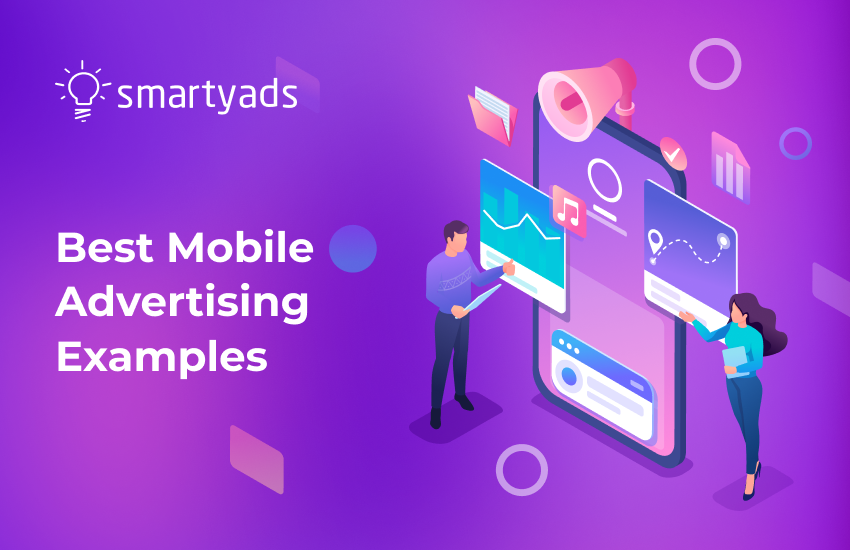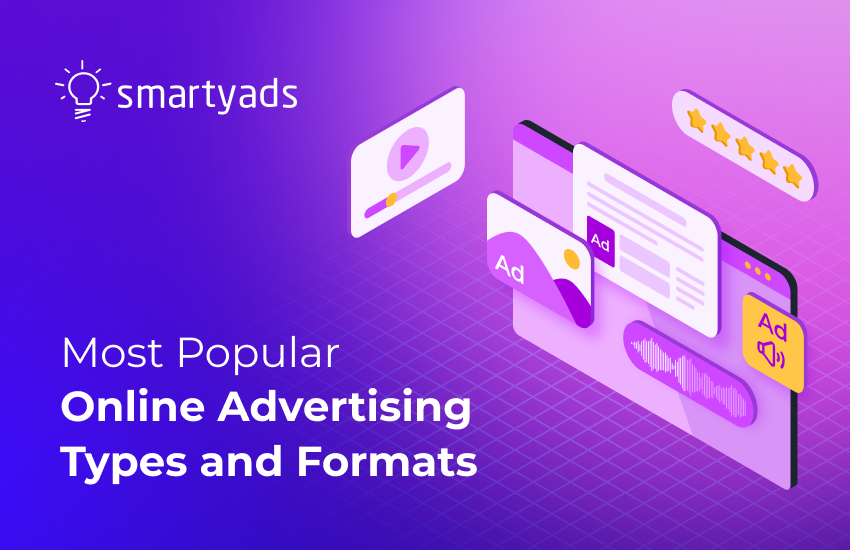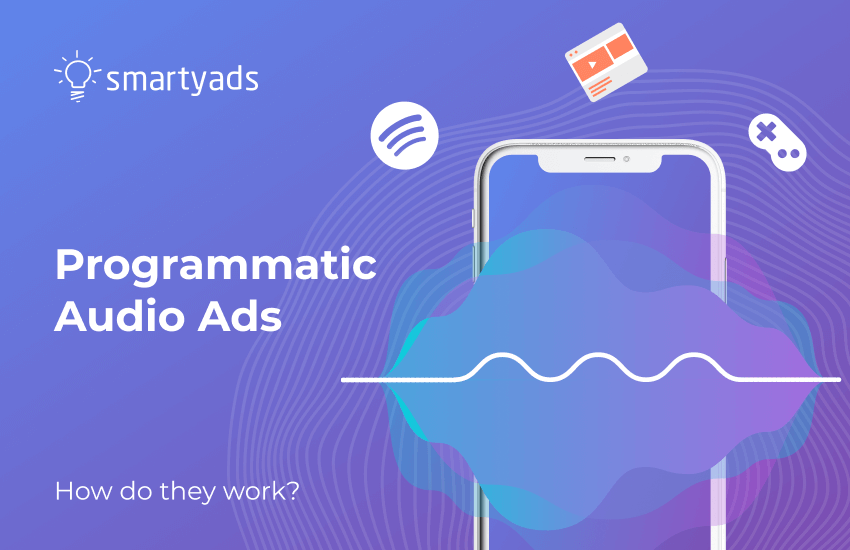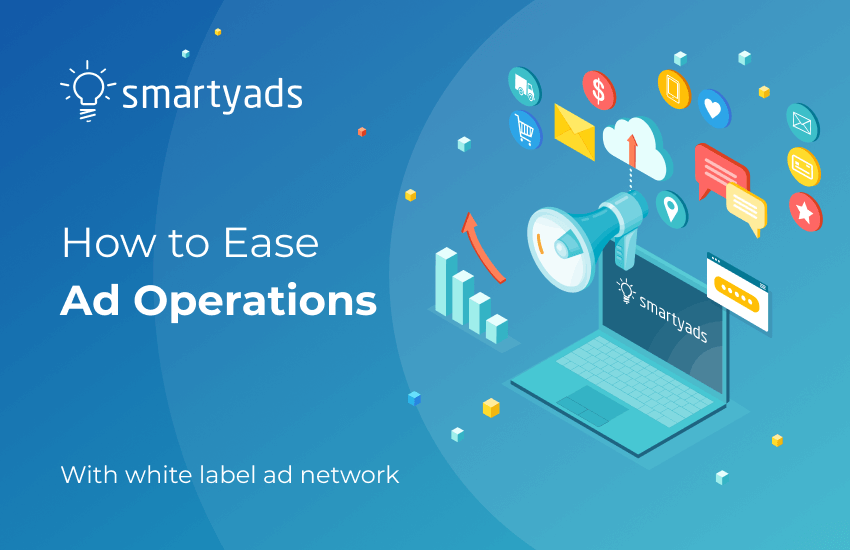Is it ever possible to imagine a typical day without mobile devices? Absolutely, but not in 2023.
Screening news feeds, checking emails, posting on social media accounts, playing a favorite game, monitoring physical activity, and tracking habits — these are only a few actions users perform with their gadgets during the day.
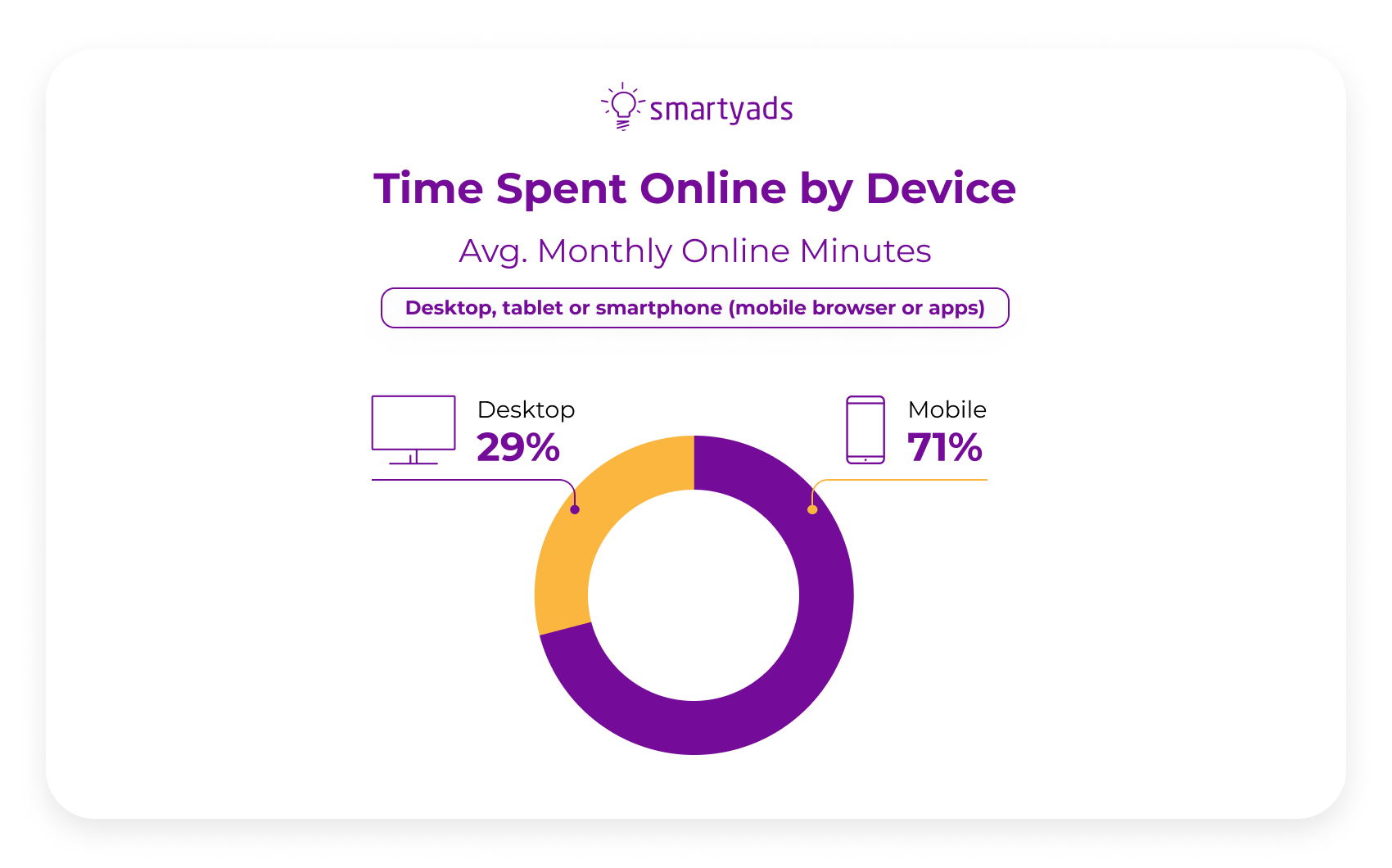
However, advertisers would say that each interaction of a mobile web user with a mobile phone gives a chance to launch outstanding mobile advertising campaigns. Reach out and engage with the relevant mobile audience first.
What mobile advertising examples can you use for achieving these and other objectives? We'll talk about that later in this article.
Mobile devices like smartphones and tablets have seamlessly integrated into our daily lives, serving as indispensable tools for communication, information consumption, and entertainment.
With their widespread adoption and usage, it is no surprise that nearly half of the global population now relies on these handheld electronics to access the vast realm of the Internet.
This surge in mobile device usage has created a golden opportunity for businesses from all corners of the world to leverage this technology for the online promotion of their products and services through mobile advertising.
So, what are Mobile Advertising Examples?
Mobile advertising examples refer to all types of ads that can be served on mobile devices like smartphones and tablets: native advertising, banners, interstitials, videos, rich media, push and pop ads, and more.
Those ads may appear in search, social media, at the middle or beginning of the video, in between text blocks.
Mobile advertising market today
The year 2022 witnessed an extraordinary milestone in mobile advertising spending, with a staggering $327 billion invested worldwide. This record-breaking figure reflects the growing recognition among businesses of the immense potential held by mobile marketing.
Notably, experts predict that this upward trajectory will continue, with mobile advertising expenditure approaching the $400 billion mark by 2024.
These numbers apply to app store ads, Google ads, Instagram ads, social media ads, pop-ups, native ads, and programmatic together.
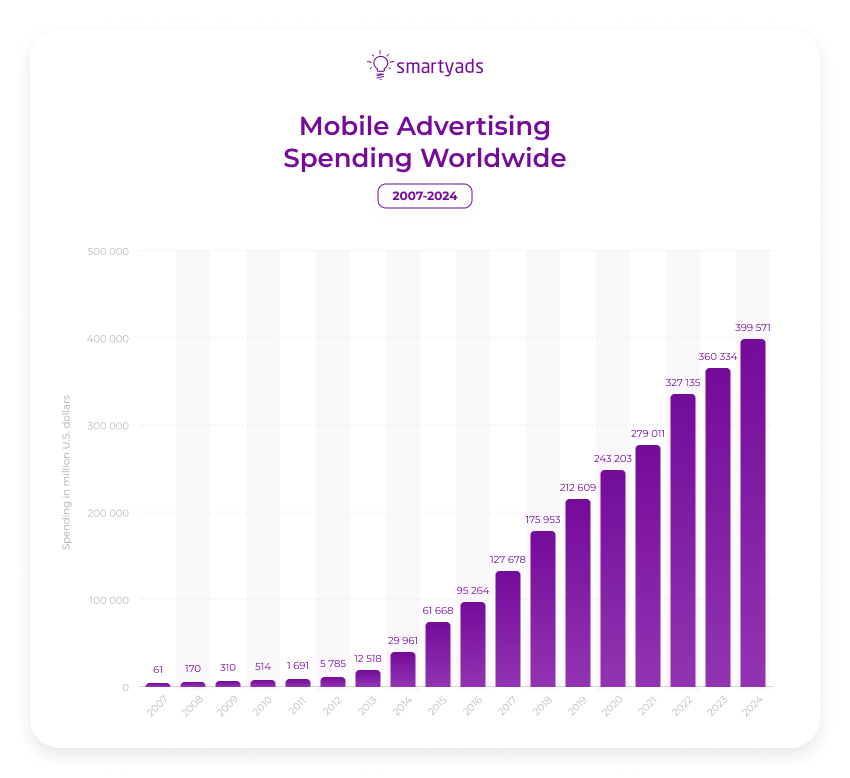
The ever-expanding mobile advertising market exhibits a remarkable growth trajectory, poised to increase fivefold by 2030.
This projection underscores the deep integration of mobile technologies into today's digital infrastructure and our interconnected personal lives. Mobile phones have become an inseparable companion, bridging the gaps between individuals, societies, and businesses worldwide.
Why mobile apps and web experiences are trending?
In this interconnected digital landscape, businesses leverage all types of mobile advertising and devices to reach their target audiences like never before.
Through innovative mobile marketing strategies, companies can tailor their messages and offerings to the preferences and behaviors of mobile users, capturing users' attention amidst the vast sea of online content.
The seamless integration of mobile devices into our daily routines has created a paradigm shift in how businesses connect with their customers.
Mobile advertising provides a direct channel for businesses to engage with consumers, enabling personalized interactions, seamless transactions, and real-time updates.
This unprecedented level of accessibility and convenience has revolutionized the way products and services are marketed and consumed, fostering a dynamic ecosystem of digital commerce.
As we gaze into the future, it is evident that mobile technologies will continue to reshape the landscape of marketing and communication. The mobile ads revolution shows no signs of slowing down, with new advancements in technology further enriching the capabilities of these handheld devices.
The possibilities for mobile marketing are boundless, from augmented reality and virtual reality experiences to voice-enabled interactions.
Types of mobile ads
The availability of multiple types of mobile ads is essential to address the diverse needs and preferences of advertisers and businesses in the digital landscape. These different ad formats serve various purposes, providing flexibility and customization to better reach and engage target audiences.
With a wide range of ad types, advertisers can tap into different strategies and creative approaches to captivate their intended audience. Each format brings unique characteristics and advantages that cater to specific campaign objectives, ensuring maximum impact and effectiveness.
Moreover, the various display ad formats allow for mobile marketing strategy with optimized ad placements across different platforms and devices. The mobile ecosystem encompasses a wide array of screen sizes, orientations, and user interfaces.
Advertisers can leverage this diversity by selecting the most suitable format that fits seamlessly into the mobile app or website, enhancing the user experience and increasing the likelihood of engagement.
Mobile advertising is not like desktop ads; it can take many different forms, be published on various platforms, and represent diverse brands and products.
Mobile banner ads
Mobile banner ads are a popular form of advertising specifically tailored for mobile screens; these are canvas ads that are visually compelling and strategically placed to capture users' attention.
A mobile ad like this typically appears as a static or animated image on mobile apps or websites and serves as a visual representation of brands, products, or services.
Examples of mobile banner advertising
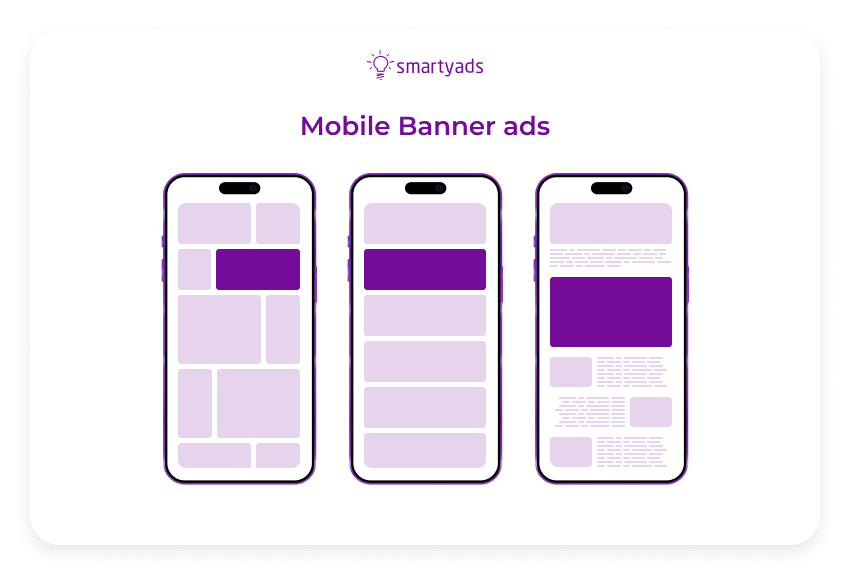
With concise text and clear calls-to-action, banner ads aim to raise brand awareness, promote offers, and drive traffic to websites or apps. Their compact size and strategic placement make them a cost-effective and efficient tool for businesses to engage their audience.
Mobile video ads
Mobile video advertising has emerged as a dominant and captivating form of advertising tailored for mobile screens. These ads leverage short video clips to engage smartphone and tablet users, deliver brand messages, showcase products, and convey compelling narratives.
The immersive nature of video content allows advertisers to capture viewers' attention and evoke emotions, especially when we talk about interstitial advertising (interstitial ads) and full-screen ads.
Examples of video formats
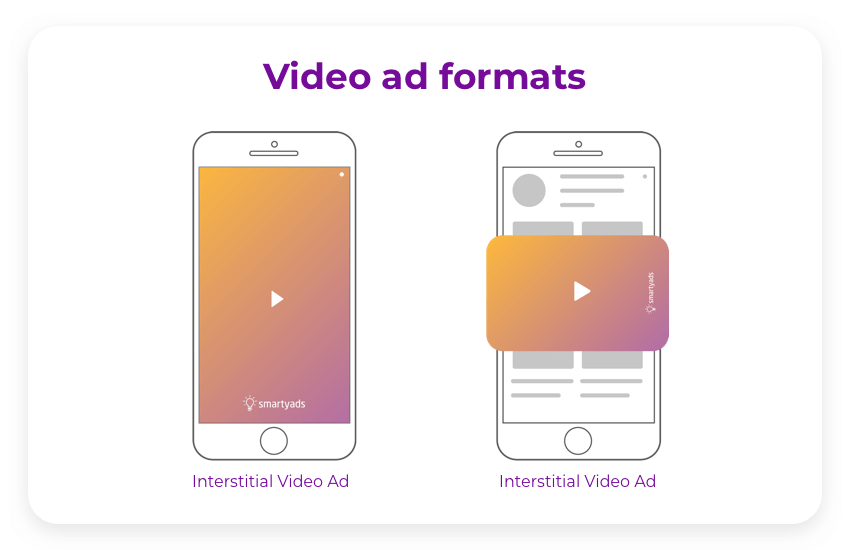
With precise targeting options, mobile video ads and mobile app ads reach specific demographics, ensuring maximum relevance.
Additionally, the shareability of these ads amplifies their impact by facilitating easy social sharing. Video ad usage is a great option for mobile strategy, as text ads are not so memorable.
As mobile phones continue to dominate digital advertising consumption, mobile video ads offer a dynamic and engaging platform to connect with smartphone users and drive user engagement.
Push notifications
Push notification mobile ads deliver targeted messages directly to users' mobile screens, capturing immediate attention and driving engagement.
These real-time push notifications appear on lock screens or in the notification center, allowing advertisers to send personalized alerts, promotions, or updates. Leveraging user data and preferences, these ads ensure relevance and timeliness.
Examples of push notifications
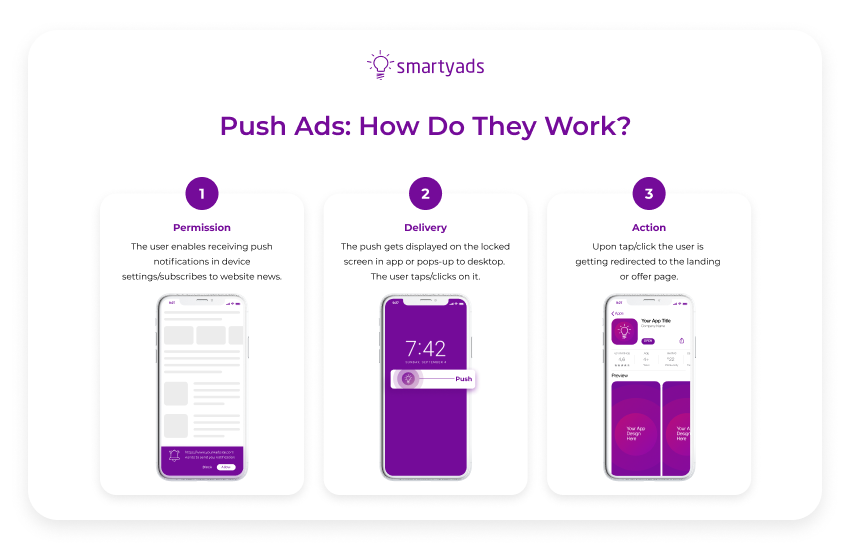
Push notification mobile ads are especially effective for re-engagement, reaching mobile users even when they're not actively using an app or browsing.
However, maintaining a positive user experience requires respecting preferences and offering opt-out options. Overall, push notification mobile ads offer a direct and powerful means for advertisers to connect with their audience and drive engagement.
In-app ads
In-app advertising seamlessly integrates with mobile applications, offering a non-intrusive advertising experience.
These ads, displayed in various formats such as banners, interstitials, native ads, rewarded ads, or videos, effectively reach and engage users while they actively use the app.
Examples of in-app ads
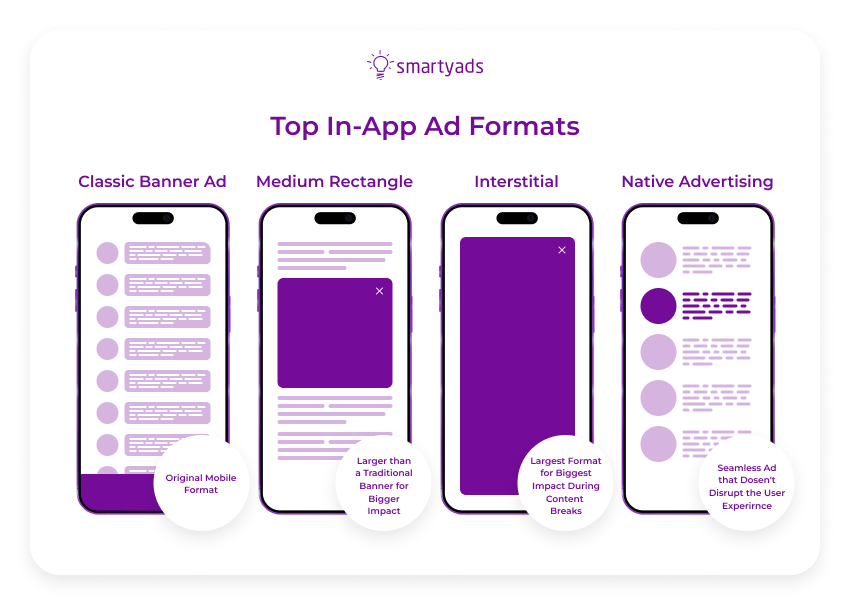
Such ads provide precise targeting options and captivate a focused audience, ensuring relevancy and interaction with app users. For app developers, in-app ads present a monetization opportunity.
Mobile search ads
Mobile search ads appear within search engine results on mobile devices, targeting users actively searching for information, products, or services (Google search ads or Apple search ads, for example). On a mobile device, this ad is displayed in the form of text ads, marked as "Ad" or "Sponsored". It is optimized for mobile screens and features headlines, descriptions, and clickable links.
Examples of mobile search ads
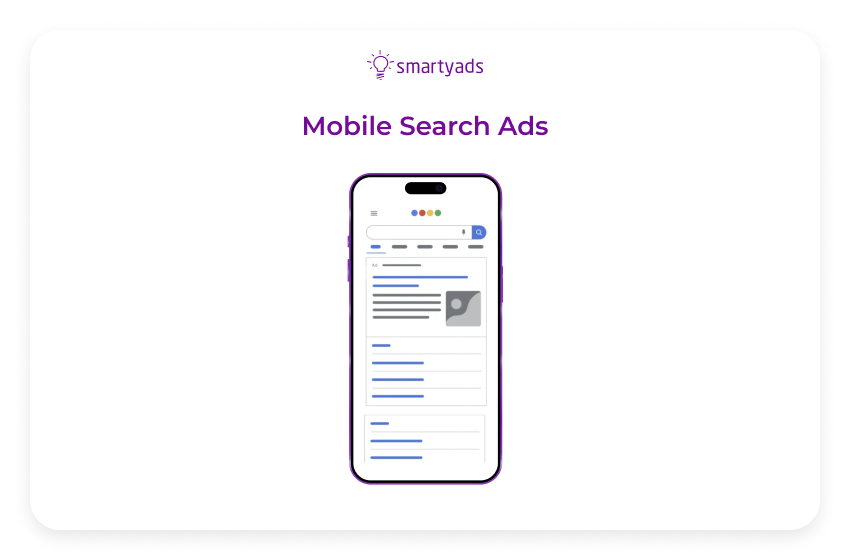
By capturing users' attention at the moment of intent, mobile search ads enable advertisers to reach potential customers seeking immediate solutions. They offer measurement and tracking capabilities for campaign optimization.
You can find more information about mobile ads and their types here.
5 Best mobile ads examples
The process of creating a good mobile advertising strategy can be challenging. That's why we've gathered some examples of the best mobile ad campaigns for your inspiration. Let's take a look at them.
Netflix banner ads
Netflix, the world's leading entertainment service provider, with an impressive subscriber base exceeding 151 million paid subscriptions worldwide, recently garnered acclaim by securing the coveted Drum Mobile Award.
The company received this prestigious accolade in recognition of its exceptional achievement in the "most innovative use of mobile" category.
By pushing the boundaries of creativity and technological prowess, Netflix captivated audiences with a groundbreaking advertising campaign that left an indelible impression.
At the heart of this campaign lay a masterful fusion of haunting and adventurous elements designed to capture viewers' attention and transport them into a world of unparalleled realism. Drawing inspiration from the popular techno-paranoia drama series, Black Mirror, Netflix adeptly mimicked the spine-chilling fear that often lingers in the minds of viewers long after watching an episode.
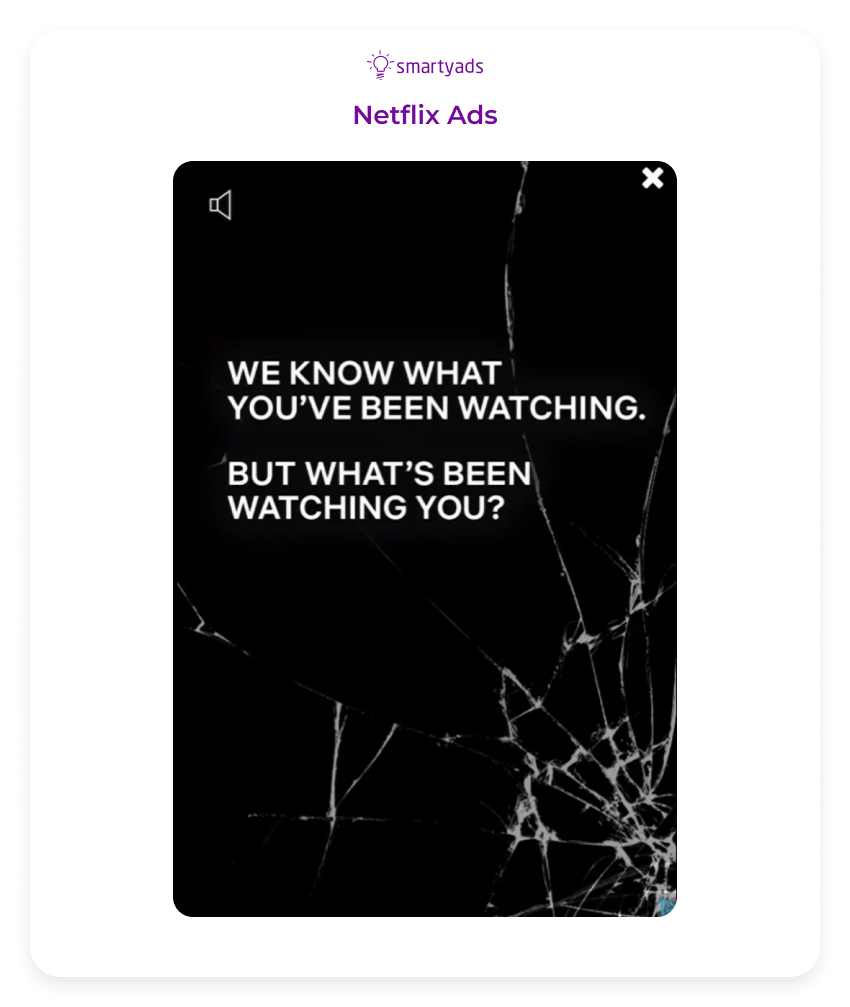
The ingenuity of the campaign lay in its ability to seamlessly integrate with the mobile screens of viewers, transforming them into broken fragments of glass that mirrored the shattered reality portrayed in the show.
This stunning visual effect evoked a sense of living within the unsettling realm of the Black Mirror, blurring the boundaries between fiction and reality.
New Yorker video ads
To effectively resonate with younger demographics, it is crucial for your creative content to grasp and harness the shared visual language prevalent in short-form video platforms.
By identifying and implementing techniques that align with this language, such as the cutout/montage/editing method employed by notable brands like New Yorker, your creative endeavors will speak directly to your own target market and audience.
This utilization of their preferred visual style will enable your content to connect more deeply and resonate more powerfully with the younger generation.
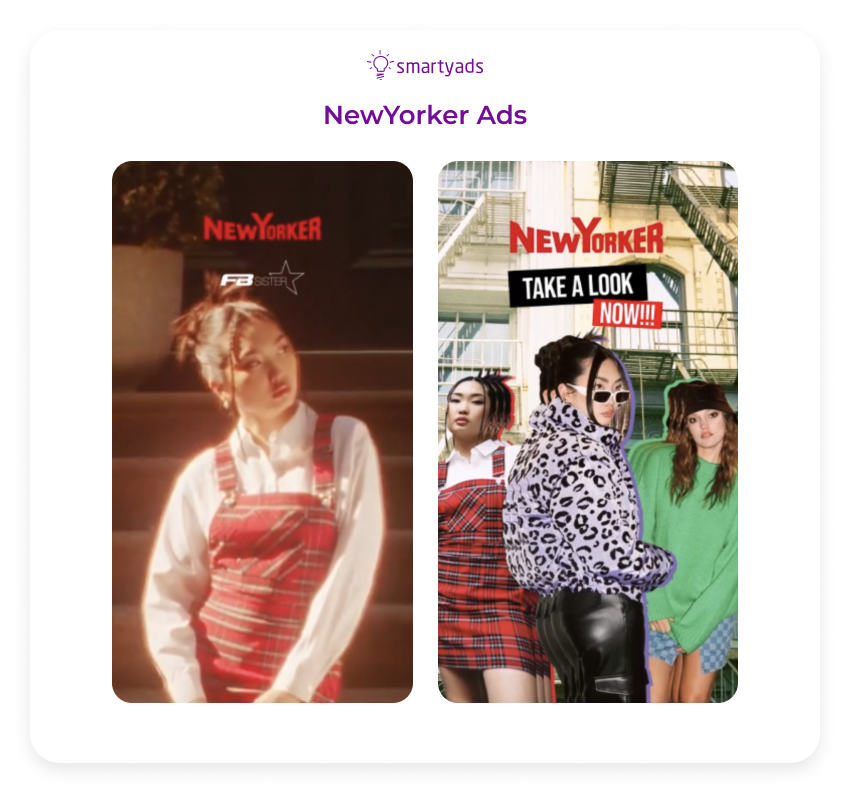
Doctor Who banner ads
Since its inception in 1963, Doctor Who has captivated audiences as a beloved British science-fiction TV show, maintaining its presence on the prestigious BBC network.
In a bid to promote an upcoming season of this iconic series, the mobile advertising agency Mobext employed an ingenious strategy by leveraging Doctor Who as a compelling "sidekick" to the content featured on a carefully curated whitelist of renowned websites.
Within this innovative mobile advertising campaign, the charismatic Doctor assumed the role of a persuasive guide, urging readers to engage further with the ad.
Upon expanding the ad, an enthralling "flip cube" format was unveiled, showcasing a captivating display of all the show's beloved characters.
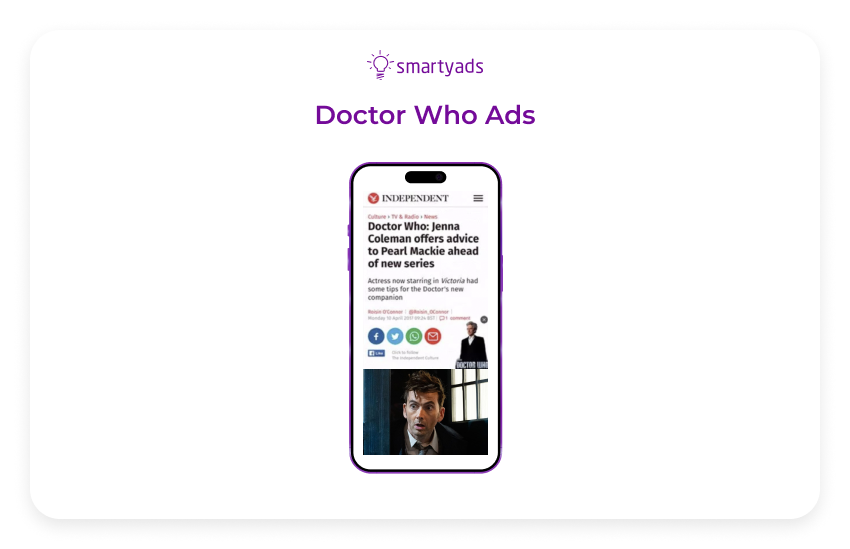
Mobext's clever utilization of Doctor Who as a dynamic companion to premium mobile ad content heightened brand awareness and effectively captivated audiences across high-profile websites.
By seamlessly blending the show's iconic characters and interactive elements, the mobile ad created an engaging and memorable experience that resonated with fans and enticed new viewers to explore the thrilling world of Doctor Who.
Nutribullet Instagram ads
Integrating a poll into your advertisement presents a straightforward yet powerful method of fostering stronger customer engagement through interactive elements.
By actively involving mobile audiences in the viewing experience, a touch of interactivity elevates their level of engagement. When incorporating a poll, it is crucial to design your creative content around this feature.
A compelling example of this approach can be seen in the Nutribullet campaign, where the screen is divided into two sections, prominently showcasing the poll. The image ads accompanying concise copy directly address the viewer, encouraging their active participation. This thoughtful design not only captures the user's attention but also motivates viewers to take part, thereby enhancing the overall impact and effectiveness of the advertisement.
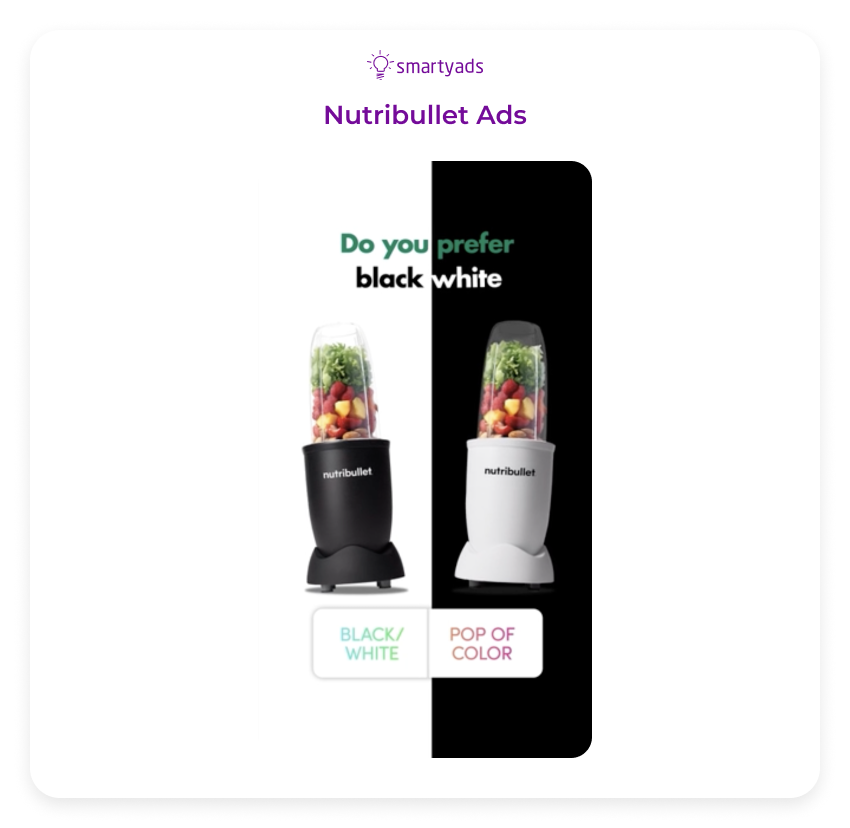
Sony Pictures playable mobile ads
Sony Pictures devised an impactful mobile ad campaign to generate brand awareness for its latest movie release. The campaign set forth specific objectives centered around measuring Engagement Rate (ER), Average Time Spent (Seconds), and Video Completion Rate (VCR).
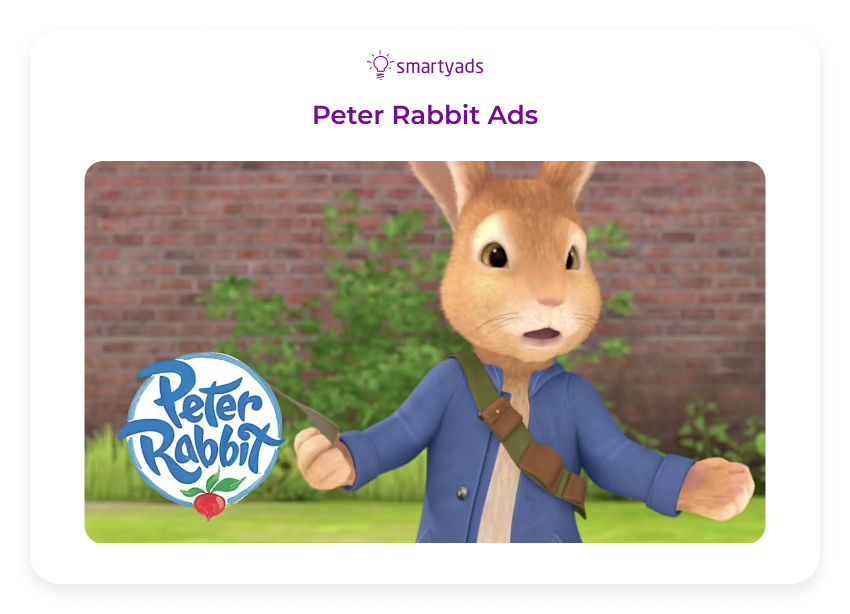
To effectively connect with its target audience, Sony developed a tailor-made video trailer exclusively for mobile platforms. This captivating trailer was strategically distributed across iOS, Android, and mobile tablets, ensuring maximum reach and engagement with existing customers.
As the trailer concluded, viewers were enticed to participate in an interactive video game experience. By clicking on character hotspots, viewers could delve deeper into the movie's storyline and gain further insights into the captivating characters it featured.
This interactive element encouraged active engagement and deepened the audience's connection with the movie.
Sony's mobile ad campaign demonstrated a comprehensive approach to captivating audiences and creating brand awareness.
Through the strategic use of custom video content, cross-platform distribution, and immersive interactive experiences, the mobile campaign successfully engaged viewers, fostering a deeper connection with the movie and amplifying the overall impact of mobile marketing efforts throughout the campaign.
Takeaways
In the fast-paced world of mobile advertising, staying ahead of trends is crucial. Leverage the power of data to track ad engagement fluctuations and make informed decisions. Keep these key points in mind:
Research is key: Understand your audience to select the most effective formats, considering the stronger purchase intent of mobile searches.
Utilize analytics: Monitor your campaigns' performance and optimize ad spending by exploring the analytics.
Platform-specific ad selection: Maximize performance by choosing the right ad formats for each medium.
Stay competitive in the dynamic mobile advertising landscape with these insights and strategies.
Launch high-quality and creative mobile advertising with SmartyAds DSP!
FAQ
Mobile advertising refers to promotional content and campaigns delivered to users' devices, such as smartphones and tablets. It encompasses various formats like banners, videos, and app interstitials and is placed on different platforms such as search engines, websites of different topics, and social media platforms, aiming to reach users on the go and capitalize on the widespread use of mobile technology for marketing purposes.
The effectiveness of a mobile ad type depends on various factors, including the preferred audience, campaign objectives, and content. Display ads offer wide visibility, while native ads seamlessly blend with content. Video ads can convey messages vividly, and interactive ads engage users. Choosing the best type requires aligning with your goals and understanding your audience's preferences.
Learning mobile ad examples is crucial for understanding effective strategies in the dynamic landscape of digital advertising. Real-world examples provide insights into successful campaigns, creative approaches, and audience engagement.By studying these cases, marketers can refine their techniques, optimize campaigns, and stay relevant in reaching and resonating with mobile users.
While the examples highlight diverse approaches, effective mobile ads can be created using popular tools like Google Ads, Facebook Ads Manager, or specialized mobile ad platforms like SmartyAds.These tools offer robust features for designing, targeting, and optimizing mobile ads, enabling businesses to reach their desired audiences and maximize campaign impact.
Yes, the featured mobile ad examples are designed to offer insights and strategies that can be adapted by businesses of all sizes.While the specific implementation may vary, the principles and creative approaches showcased in these examples can be valuable for tailoring mobile advertising efforts to suit different business scales and industries.
Leverage mobile advertising examples for business development by analyzing successful campaigns to identify effective strategies, creative elements, and audience targeting. Adapt these insights to tailor your own mobile ad initiatives, aligning with your brand identity and goals.By integrating proven tactics, you can enhance engagement, expand your reach, and drive growth in your mobile advertising efforts.
